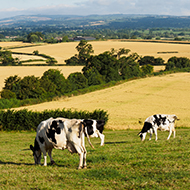Farm vets to launch sustainability policy

"As farm vets, we are allied to a sector that acts as guardians of the countryside" - Elizabeth Berry, BCVA president.
The British Cattle Veterinary Association (BCVA) is to launch its own Sustainability Policy in the coming weeks, calling for a bespoke on-farm approach to achieve net zero in British farming.
The announcement follows the pledge made by world leaders at the 26th United Nations Climate Change Conference (COP26) to cut methane emissions by 30 per cent by 2030.
In its response, the BCVA ‘broadly welcomes’ the commitment but questions the ‘inevitable commentary that places a disproportionate emphasis on agriculture’s role’.
The response reads: ‘Just 100 companies have been identified as the source of more than 70 per cent of the world’s greenhouse gas emissions since 1988, and there isn’t a farm amongst them.
‘The Carbon Majors report demonstrated that a relatively small set of fossil fuel producers hold the key to turning around the planet’s carbon emissions, yet so many headlines on this subject focus on the impact of agriculture, even though we know that in the UK our farms amount about one-tenth of UK greenhouse gas emissions – and just six per cent if only considering livestock farming.’
It continued: ‘To have conversations about sustainability that can contribute to real change, it is vital that we take an evidence-based approach – one that understands the science and realises that biogenic methane, the kind produced by cattle, is not the same as the methane produced by fossil fuels.’
The BCVA believes that efforts to reduce net-zero should take place on-farm, with a focus on health and welfare, biodiversity, soil health, water management, diffuse pollution, and social, ethical, and economic factors.
'This must be achieved without outsourcing our environmental footprint via imports produced to lower standards, the BCVA said. 'High welfare food production and food security should remain the goal.'
BCVA president, Elizabeth Berry, said: “As farm vets, we are allied to a sector that acts as guardians of the countryside, and our farm clients understand their crucial role in the management of soil, water, nitrogen, and carbon cycles and, in turn, the biodiversity of the UK’s farmland.
“We work alongside our colleagues in UK agriculture to drive increased efficiency in both the dairy and beef sectors by providing preventive healthcare and treatment. We all share a commitment to meet welfare standards, safeguarding public health and creating an environment that meets our needs today without compromising the ability of future generations to thrive.”



 The RCVS has announced a new version of its 1CPD mobile app, with enhanced features for veterinary surgeons and veterinary nurses to record their continuing professional development.
The RCVS has announced a new version of its 1CPD mobile app, with enhanced features for veterinary surgeons and veterinary nurses to record their continuing professional development.